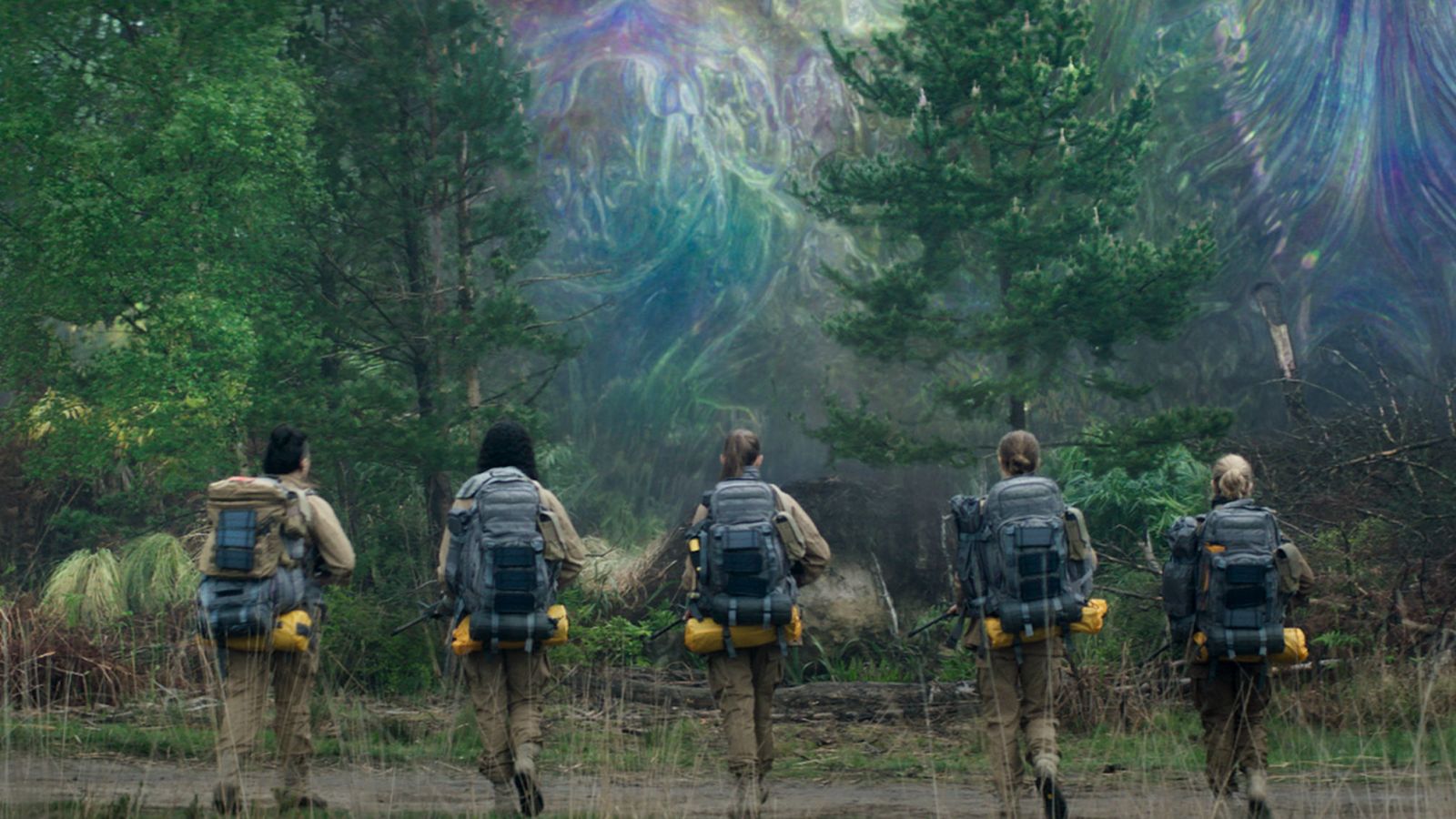
MPAA Rating: R | Rating: ★★★½
Release year: 2018
Genre: Fantasy, Sci-Fi, Thriller Director: Alex Garland
I did not see Annihilation the way it was meant to be seen, but I’m glad to have seen it at all. Released in theaters and barely promoted in the US, Paramount chose to release the film via Netflix streaming in the UK. Thus, what is likely a richly immersive visual and aural theatrical experience was viewed in my living room, interrupted at times by family members walking through. I say all this because I imagine I am missing something of the unsettling thrills and cerebral mindf*ck of Alex Garland’s sci-fi adaptation of Jeff VanderMeer’s novel. Editor Devindra Hardawar described the different viewing experiences using a religious metaphor: “Seeing a film in a theater, especially a film as masterful as Annihilation, is a bit like going to church. It soothes my soul, and I feel even more at ease when I’m with an audience that’s seeing the light. At home on my couch, it’s like trying to find enlightenment from a televangelist.” So, I’m basing my cinematic theology of Annihilation on the televangelist version, which is the version most likely to be seen in the future when Annihilation leaves theaters across North America.
Annihilation follows biologist and former soldier Lena (Natalie Portman) as she retells the story of her supposedly-dead special forces husband, Kane (Oscar Isaac), after he suddenly reappears following a top-secret military mission. After Kane quickly becomes critically ill, the two are intercepted by government officials and brought to Area X, a facility just outside of a cosmic environmental event called “The Shimmer” somewhere near the southern American coastline. Lena learns that after three years of observation and expeditions, Kane is the only person to ever have emerged from the Shimmer alive. Determined to find out what happened, Lena joins a cadre of specialists about to enter the void: psychologist Ventress (Jennifer Jason Leigh), physicist Josie Radeck (Tessa Thompson), anthropologist Cass Sheppard (Tuva Novotny), and paramedic Anya Thorensen (Gina Rodrieguez). As the group enters into The Shimmer and its brightly colorful aesthetic, they begin to discover it acts as both a prism and a prison. Through the sound design and vivid images, Garland creates an atmosphere which feels deliberately distorted and diaphanous, as if we are viewing the world through a soap bubble, although one which brings dirt to the surface instead of removing the stains. There are disturbing and terrifying moments, including some scenes with a mutated bear which serve as the extreme counterbalance to the kindness of Paddington 2. Overall, the mood of Annihilation in The Shimmer is one of constant anxiety.
Annihilation appears to be an allegory, albeit one whose metaphorical reference could be interpreted in a variety of ways. That each of these women carries some sort of burden or loss–sometimes physical, certainly emotional and spiritual–seems significant in grasping the meaning behind its images and particularly its enigmatic final act. In a conversation between Lena and Ventress about Kane’s choice to volunteer for a suicide mission, the psychologist tells the biologist, “Isn’t the self-destruction coded into us? Imprinted into each cell.” This notion–that human beings are inherently self-destructive–is a darkly bleak anthropology, though one which fits well within Garland’s oeuvre, such as Ex Machina, Sunshine, Never Let Me Go, and 28 Days Later. Time and memory are painted in blurred streaks in Annihilation; food, sleep, and sustenance become secondary (Lena tells her interviewers, “I don’t remember eating), and each character seems isolated from the others (this is not a team as much as it is a group of broken individuals). It’s a striking metaphor for the human experience in the face of the painful unknown–depression, disease, divorce, even death. While the literal events which occur in the climax are nowhere near as obscure or opaque as Andrei Tarkovsky’s Stalker and Solaris—Annihilation feels like Stalker for people who don’t like Tarkovsky’s pacing–the metaphoric was teased into active thought as I stared in wonder at the dazzling mirrored dance before me. Still, just as with Ex Machina, I left the film admiring what I saw, but uncharacteristically indifferent, perhaps due to its cold gaze. Some filmmakers seem to truly love their characters (recent examples are Wes Anderson, Greta Gerwig, and Stephen Cone), but I don’t get the sense that Garland is one of them. I did not see Annihilation the way it was meant to be seen, but I’m glad to have seen it at all.
IMDB Listing: http://www.imdb.com/title/tt2798920/
Leave a Reply